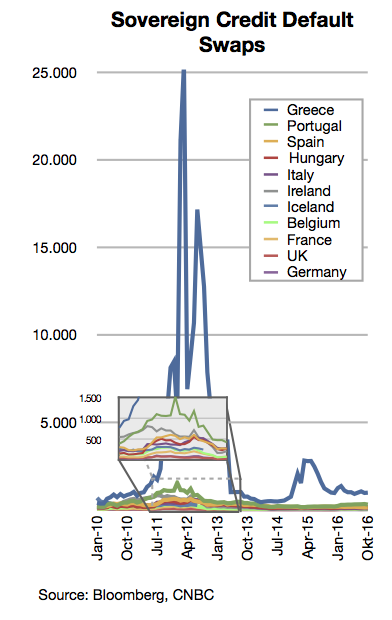Although I had thought that the issue with Cyprus was very similar to the one with Greece, Portugal and Ireland it appears that it isn't so in the eyes of some. From what I can see on some websites, it appears that the case is not so clear for one reason or another. For example, denying aid to the island has been an issue in the German parliament over the past few weeks. Notably, Angela Merkel's coalition partners the FDP have raised their voice in opposing a bail-out scheme. Even in Merkel's own party (the CDU) there appears to be some hesitation. Yet, it appears that they are not so against it as they used to be, if we believe Spiegel.
From my point of view, it appears that some politicians are not really thinking this through. For their sake, let's take a walk through this once again. Just to make it simple for them I will not even use country names so that it will be easier to be used as a formula in the future.
We have two options:
1. We give money to [insert nation here]
2. We let them default
Consequences of Option 1:
The nation receiving the aid would have to be very careful with its public finances. Thus it will inevitably have to make some budget cuts, including cuts in wages and salaries. However, these cuts will have to be implemented slowly. If they are rapidly employed on the economy they will cause a severe contraction (for a simple thought experiment on fiscal multipliers have a look at this) and thus increase the debt-to-GDP ratio significantly, making the debt unsustainable. This would mean that a debt haircut must be implemented which will mean that either private investors (with banks being the majority) or assisting nations (or both) would lose money. If a haircut is to be avoided then further assistance in the form of extending the debt period and significantly lowering the interest rates is to be given. Yet, this would also mean money lost and since losing money is not good for reputation we can agree that the best way to deal with option 1 would be to give the nation the money it needs but make gradual fiscal corrections in order for its debt to remain sustainable. In addition what would be an even better idea would be to directly bail-out banking institutions and force them to invest these money in their government's bonds, but that might be too much thinking. So let's stick to what is easy: If we give money then we have to be sure that change is being done gradually if we do not want unnecessary losses.
What should be mentioned here is that the ECB could also be given the authority to deal with the issue of financial aid. As it has large quantities of money available it can readily assist any ailing nation without any other nation's assets being in danger.
Consequences of Option 2:
If the nation does not receive any aid then it will survive for as long as it can with what money it has left and then declare bankruptcy. The issue is what happens next. The definition of default is when a nation cannot pay the interest on its debts. Then, sooner or later this will also mean that it will also cease to pay its debt (the technical term for that is insolvency). What happens then: well first a debt restructuring for foreign creditors occurs, which means either debt restructuring or debt cancellation. This is in essence a haircut which ends up in loses for the nation's creditor. Then after this huge mess where the state itself has to decide which creditors to ignore and which to honour, another issue arises: how is the nation going to get new money to finance its needs (including the needs of its banks)?
There are only two options for that: either receive money from external sources or print more of its national money. For a country which is in the Eurozone, however, the latter cannot be done. So other countries have to decide again whether to lend it or not. If they do decide to lend the nation then they would be inconsistent to the decision they have made before (when not choose Option 1 instead of Option 2, and suffer the complications of these decisions if you are going to give money after all?) so they will most likely choose not to lend it money again. To which, the already defaulted nation has to respond with exiting the Eurozone in order to print its own money.
Thus, choosing not to lend money to a nation in danger of default leads to their exit from the Eurozone.
Is this bad? Well it depends. First of all we cannot have conflicting policies: either we assist all nations in need or we do not assist any. So if we assist one we have to assist all the others as well. Second, we have to figure out whether we want to preserve the Eurozone or not. David Cameron stated that the UK should have a referendum on whether it would prefer to stay in the EU or not. If one country exits the euro then it will only be a matter of time before every country which faces the dilemma of inane austerity and a Eurozone exit will choose the latter over the former.
When we analyze it deep enough it boils down to whether we want to maintain a common monetary union or not. If we do then the only solution is to assist all countries needing a bail-out. If we do not then why do we bother having this discussions at all?
